Freud: “Father of Psychoanalysis” – The Theory and Practice of Psychology and Its Impact on Contemporary Society
イントロダクション
ジークムント・フロイトは、19世紀末から20世紀初頭にかけて活動したオーストリアの精神医学者であり、精神分析学の創始者として知られています。
彼の思想は心理学や精神医学の分野に大きな影響を与えました。
思想の特徴としてフロイトは、無意識の概念を発見し、それを中心に心理学を展開していったことです。
彼は人間の行動や感情は意識に表れない無意識の力によって影響を受けると考え、これを解明するために精神分析法を開発しました。
また、幼児期の経験や性的欲望が個人の発達や心の健康に影響を及ぼすと考え、これらを探求することで心の問題を理解しようとしました。
フロイトはたくさんの著作を出版していますが、とくに有名なものに、『ヒステリー研究』、『夢判断』、『精神分析入門』などがあります。
フロイトの思想は当初は議論を巻き起こしましたが、後に精神医学や心理学の分野で大きな影響を持つようになりました。
彼の理論は心の健康と疾患の理解に貢献し、カウンセリングや心理療法の基盤を築きました。
また、無意識の概念や夢の解釈、人間の欲望や衝動に関するアイディアは、文化や芸術、哲学にも影響を与えました。
ただし、フロイトの一部の理論やアプローチは現代の科学的知見とは異なるとされることもあり、議論が続いています。
それにもかかわらず、彼の貢献は心理学や精神医学の歴史において大きな足跡を残しています。
Introduction
Sigmund Freud, an Austrian psychiatrist who worked from the late 19th to the early 20th century, is renowned as the founder of psychoanalysis.
His ideas profoundly influenced the fields of psychology and psychiatry. One of Freud’s notable contributions was his discovery of the concept of the unconscious, around which he developed the field of psychology.
He posited that human behavior and emotions are influenced by unconscious forces that do not manifest in consciousness, and he developed psychoanalytic techniques to explore this.
Freud also believed that early childhood experiences and sexual desires impact an individual’s development and mental health, seeking to understand psychological issues through these explorations.
Among his numerous publications, notable works include “Studies on Hysteria,” “The Interpretation of Dreams,” and “Introductory Lectures on Psychoanalysis.”
Initially sparking debate, Freud’s theories later exerted significant influence in psychiatry and psychology, contributing to the understanding of mental health and laying the foundation for counseling and psychotherapy.
His concepts of the unconscious, dream interpretation, human desires, and impulses also influenced culture, art, and philosophy.
However, some of Freud’s theories and approaches diverge from contemporary scientific knowledge, continuing to provoke discussion.
Nevertheless, his contributions have left a profound mark on the history of psychology and psychiatry.
フロイトの生涯と人物像
フロイトは、1856年にオーストリア帝国のモラヴィア地方で、ユダヤ系の商人の家庭に生まれました。
The Life and Persona of Freud
Freud was born in 1856 in the Moravian region of the Austrian Empire, into a family of Jewish merchants.

University of Vienna
17歳でウィーン大学に入学し、物理学を2年間学んだ後、医学部の生理学研究所に入り、両生類・魚類の脊髄神経細胞の研究をしました。
1881年に医学博士号を取得した後、ウィーンの精神病院で働き、ヒステリー患者の治療に取り組みました。
ヒステリーは当時、脳の病気や精神障害と考えられていました。
フロイトは、ヒステリーの原因は脳ではなく、無意識の性的欲求にあると考え、催眠療法や自由連想法などの治療法を用いて治療をしました。
1895年に、フロイトとヨセフ・ブロイヤーは、ヒステリーの治療法に関する論文を発表しました。
この論文の中で、フロイトは「無意識」という概念を提唱し、人間の心は意識と無意識の二つの部分から構成されているとしました。
At the age of 17, he enrolled at the University of Vienna, where he studied physics for two years before joining the Physiology Institute of the Medical School. There, he conducted research on spinal nerve cells in amphibians and fish.
After obtaining his medical doctorate in 1881, he worked at a psychiatric hospital in Vienna, focusing on the treatment of hysteria patients. At that time, hysteria was believed to be a brain disorder or mental illness.
Freud proposed that the cause of hysteria lay not in the brain but in unconscious sexual desires. He employed therapies such as hypnosis and free association to treat patients.
In 1895, Freud and Josef Breuer published a paper on their treatment methods for hysteria. In this paper, Freud introduced the concept of the “unconscious,” suggesting that the human mind comprises two parts: conscious and unconscious.
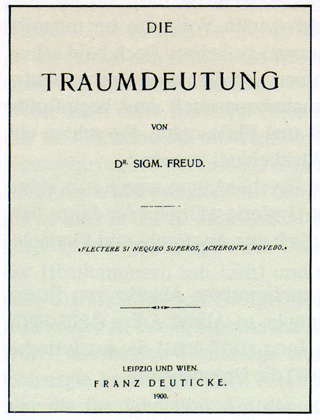
“Dream Interpretation”: The Original German Edition Cover
1900年には、『夢判断』を発表しました。
この著作の中でフロイトは、夢は「無意識の欲求の表れ」であるとし、夢判断によって無意識の欲求を解明することができるとしました。
1902年には、「精神分析学会」を設立し、精神分析学の理論と技法を広めました。
フロイトの精神分析学は、当時の精神医学の常識を覆すものであり、多くの批判にさらされました。
しかし、フロイトは自身の理論を貫き通し、精神分析学を現代の心理学の基礎として確立しました。
フロイトは、1938年にナチス・ドイツの迫害を逃れ、イギリスに亡命しましたが、1939年に、ロンドンで亡くなりました。
フロイトは、無意識の発見、リビドー論、心理性的発達理論など、現代の心理学に大きな影響を与えた人物です。
彼の理論は、心理学以外の人文学などをはじめとした近接学問にも発展し、20世紀の思想に大きな影響を与えました。
フロイトの人物像は、非常に複雑で矛盾に満ちたものであると言われています。
一方で、非常に強い意志と信念を持っていた人物としても知られています。
フロイトは、自身の理論を貫き通し、精神分析学を現代の心理学の基礎として確立しました。
自然科学者としての出発
フロイトは、精神分析学に至る前の初期の経歴で、自然科学者としての興味を持っていました。
ウィーン大学で医学を学び、特に神経学や生理学に興味を持っていました。
これらの自然科学的な知識は、後に彼の精神分析学の基盤を築く際に役立つこととなりました。
フロイトは神経学や生理学の分野での研究に没頭し、論文や研究を行いました。
彼の初期の研究は、神経系や脳の機能に関する理解を深めるために重要でした。
しかし、彼は次第に心の内面の複雑さに興味を持つようになり、特にヒステリーの症例に取り組む中で、心の非常に複雑な要素が純粋な生物学的な側面だけでは説明しきれないことに気付くようになりました。
この段階で、フロイトのアプローチは自然科学の領域から心理学や哲学の領域に移行していきました。
彼は無意識の力や心の奥底に潜む願望、トラウマ、そして個人の心理的な成長に関する洞察を発展させていきました。
この過程で彼は自然科学者としてのアプローチを心理学の領域に持ち込むことで、新たな理論や方法論を創出していったのです。
In 1900, Freud published “The Interpretation of Dreams.”
In this work, Freud argued that dreams are manifestations of “unconscious desires,” and through dream interpretation, one can elucidate these unconscious impulses.
In 1902, he founded the “Psychoanalytic Society,” promoting the theory and techniques of psychoanalysis.
Freud’s psychoanalysis challenged the conventional wisdom of psychiatry at the time, facing considerable criticism.
Nevertheless, Freud persisted with his theories, establishing psychoanalysis as a foundation of modern psychology.
In 1938, fleeing Nazi persecution, Freud sought refuge in England, where he passed away in 1939 in London.
Freud’s discoveries about the unconscious, libido theory, and psychosexual development profoundly influenced modern psychology.
His theories extended into humanities and adjacent disciplines, shaping 20th-century thought significantly.
Freud’s personality is often described as deeply complex and contradictory, known for his strong will and conviction.
Starting as a Natural Scientist
Before his path to psychoanalysis, Freud initially pursued interests as a natural scientist.
Studying medicine at the University of Vienna, he particularly focused on neurology and physiology.
His grounding in these natural sciences would prove crucial in laying the groundwork for his later psychoanalytic endeavors.
Freud immersed himself in research and publications within the fields of neurology and physiology.
His early studies were pivotal in deepening the understanding of the nervous system and brain functions.
However, he gradually developed an interest in the complexities of the human psyche, especially while treating cases of hysteria, realizing that biological explanations alone couldn’t fully account for the intricacies of the mind.
At this juncture, Freud’s approach shifted from the realm of natural sciences to psychology and philosophy.
He began to explore unconscious forces, submerged desires, traumas, and insights into personal psychological growth.
By bridging his approach as a natural scientist into psychology, Freud pioneered new theories and methodologies.
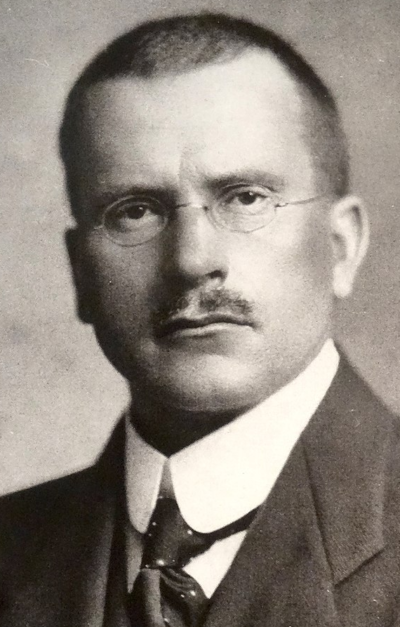
Carl Gustav Jung (1875-1961) was a Swiss psychiatrist and psychologist.
ユングとの出会いと訣別
フロイトとユングは、初めて会ったのは1907年で、ユングがフロイトの精神分析学のアプローチに興味を持ち、彼に手紙を送ったことから始まりました。
フロイトはユングの才能を高く評価し、彼を精神分析運動に迎え入れました。
ユングはフロイトのアイデアを学び、発展させ、新しい心理的な概念を提唱しました。
しかし、両者の関係は次第に緊張を抱えるようになりました。
主な原因の一つは、ユングの新たなアイデアや理論がフロイトの見解とは異なり始めたことでした。
特にユングが個人の精神における宗教的要素やスピリチュアルな側面に興味を示すようになり、それがフロイトとの思想的な不一致を引き起こす要因となりました。
結果訣別することになりますが、この訣別によって、フロイトとユングのアイデアは別々の方向に進化しました。
ユングは分析心理学を発展させ、個人的な無意識や集合的無意識、アーヒャイルなどの概念を提唱しました。
一方で、フロイトは精神分析学を深化させ、新たな患者と弟子たちと共に研究を進めました。
この出会いと訣別は、精神分析学の歴史において重要な節目とされており、フロイトとユングの間にあった対立や相違が、それぞれの思想の発展に影響を与えたと言えます。
Encounter and Parting Ways with Jung
Freud and Jung first met in 1907 when Jung expressed interest in Freud’s approach to psychoanalysis and initiated contact by writing him a letter.
Freud highly valued Jung’s talents and welcomed him into the psychoanalytic movement.
Jung learned from Freud’s ideas, expanded upon them, and introduced new psychological concepts.
However, their relationship gradually became strained.
One major cause was Jung’s development of new ideas and theories diverging from Freud’s views.
In particular, Jung began to explore religious and spiritual dimensions within the individual psyche, which contributed to ideological disagreements with Freud.
Ultimately, they parted ways, leading Freud and Jung’s ideas to evolve in separate directions.
Jung went on to develop analytical psychology, proposing concepts such as personal unconscious, collective unconscious, and archetypes.
Meanwhile, Freud deepened psychoanalysis, continuing his research with new patients and disciples.
This encounter and parting ways marked a significant milestone in the history of psychoanalysis, as the conflicts and differences between Freud and Jung influenced the development of their respective philosophies.
フロイトの精神分析学
フロイトの精神分析学は、人間の心理的な構造や動機、無意識や抑圧などの概念を用いて、人間の行動や精神病理を説明しようとする学問です。
フロイトは、人間の心は自我、超自我、イド(無意識)という三つの領域に分けられると考えました。
自我は現実に適応しようとする合理的な部分であり、超自我は社会的な規範や道徳に従おうとする部分であり、イドは本能的な欲求や衝動を表す部分です。
これらの領域は互いに葛藤し、心理的な緊張を生み出します。
フロイトは、この緊張を解消するために、人間は無意識的にさまざまな防衛機制を使うと主張しました。
例えば、抑圧は不快な思い出や感情を無意識に忘れようとする防衛機制です。
フロイトの精神分析学は、夢や言い間違いなどの現象を通して、無意識の内容を明らかにしようとする方法論も提供しました。
フロイトの精神分析学は、20世紀初頭に革命的な影響を与えたものの、その後の心理学や哲学では多くの批判や修正を受けました。
しかし、フロイトの精神分析学は、文化や芸術においても深い影響を残しました。
Freud’s Psychoanalysis
Freud’s psychoanalysis is a discipline that seeks to explain human behavior and psychopathology using concepts such as the structure of the human psyche, motivations, unconscious processes, and repression.
Freud proposed that the human psyche is divided into three regions: the ego, the superego, and the id (unconscious).
The ego is the rational part that adapts to reality, the superego adheres to societal norms and morals, and the id represents instinctual desires and impulses.
These regions often conflict with each other, creating psychological tensions.
Freud argued that humans employ various defense mechanisms unconsciously to resolve these tensions. For instance, repression is a defense mechanism where unpleasant memories or emotions are pushed into the unconscious.
Freud’s psychoanalysis also provided methodologies to uncover unconscious contents through phenomena like dreams and slips of the tongue.
While Freud’s psychoanalysis had a revolutionary impact in the early 20th century, it has since faced criticism and modifications in psychology and philosophy.
Nevertheless, Freud’s psychoanalysis left a profound influence on culture and the arts.
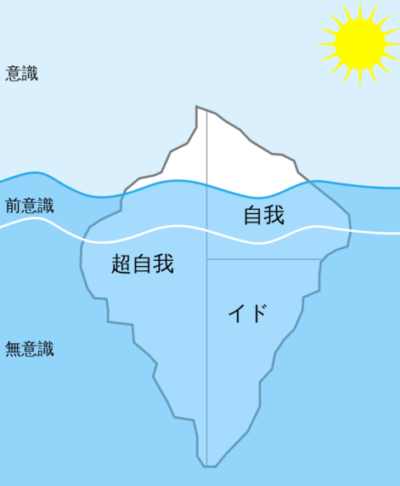
Freud’s Structural Theory
「意識は氷山の一角とは?」
フロイトの心理学における「意識は氷山の一角」という言葉は、彼の精神分析理論の中で重要なコンセプトの一つです。
この表現は、人間の心のプロセスが意識と無意識の二つの大きな領域から成り立っており、意識がその一部に過ぎないことを強調するために用いられています。
意識とは、氷山の水面に見える部分のようなもので、人々が普段意識的に感じ、考え、理解できるものです。
この部分には日常の思考、感情、願望、知識が含まれます。
無意識とは、氷山の水面下に隠れた部分で、人々が意識的には認識できない思考、感情、欲望、トラウマ、過去の経験などが含まれます。
フロイトは無意識が個人の行動や心理症状に大きな影響を与えると考え、精神分析療法を通じて無意識の要因を明らかにしようとしました。
この比喩的な表現は、人間の心の複雑さと深層心理学の理解において、一部の情報しか意識に現れていないことを示唆しています。
フロイトの理論に従えば、人々の行動や感情は無意識に根ざしており、それを理解することが重要であると考えました。
したがって、精神分析は無意識の深層にある要因を解明し、個人の心理的問題を理解し、治療する手法として用いられました。
無意識、 自我、 超自我
無意識、自我、超自我は、フロイトの精神分析理論における基本的な概念です。
これらの概念は、個人の心の構造と機能を説明するために使用されます。
無意識は、先ほど述べたとおり、心の中で最も深層にある領域で、個人の意識の外に存在すると考えられています。
フロイトは無意識が人の行動や心理症状に大きな影響を与えると信じ、それを解明しようとしました。
自我は、個人の意識の中心であり、現実世界との関係を仲介し、調整する役割を果たします。
自我は現実の要求や社会的な規範に従い、欲望や無意識の要求との調整を行います。
自我は「現実の原則」に従い、個人が現実的で合理的な方法で欲望を満たす手助けをします。
超自我は、個人の道徳的な規範や価値観を内在化したものです。
これは倫理的な原則や親から学んだ道徳的な価値観に基づいて行動する役割を果たします。
超自我はしばしば厳格で、個人に対して厳しい基準を課し、自己規制や罪悪感を引き起こすことがあります。
これらの概念は、フロイトの精神分析理論において、個人の心の中での相互作用や対立を説明するために用いられます。
自我は無意識の欲望と超自我の道徳的な圧力との間でバランスを取り、個人の行動や感情の調整を行います。
この心の構造の理解は、個人の心理的問題や行動に対するアプローチや治療において役立ちました。
夢と錯誤行為の解釈
心理学的な観点からの夢の解釈とは、夢は心の無意識の一部が表面に現れたものとされ、個人の感情、願望、不安、抑圧された思考などが夢の象徴的な形で表現されると考えられています。
夢の解釈は、夢分析と呼ばれ、フロイトが発展させました。
夢は隠れたメッセージや無意識の要因を明らかにする手段として用いられます。
心理学的な観点からの試行錯誤の解釈とは、試行錯誤は学習や問題解決の過程で起こる誤りや間違いを指します。
心理学的には、試行錯誤は問題解決の一部として重要であり、失敗から学びながら最終的に解決策を見つけ出すプロセスを表しています。
これらの二つの概念は異なる文脈で使用されますが、夢の解釈は主に心の無意識のプロセスと関連し、試行錯誤の解釈は学習や問題解決のプロセスに関連しています。
両方の概念は心理学や精神分析の理論と実践において重要であり、個人の行動や心理状態の理解に役立ちます。
“Consciousness as the Tip of the Iceberg”
In Freudian psychology, the phrase “consciousness as the tip of the iceberg” is a pivotal concept within his psychoanalytic theory.
This expression highlights the idea that human mental processes consist of two major domains: conscious and unconscious, with consciousness representing only a small part.
Consciousness, akin to the visible tip of an iceberg, encompasses what individuals normally perceive, think, and understand consciously in their daily lives.
This domain includes everyday thoughts, emotions, desires, and knowledge.
On the other hand, the unconscious, like the submerged part of an iceberg, houses thoughts, emotions, desires, traumas, and past experiences that individuals are not consciously aware of.
Freud believed that the unconscious significantly influences human behavior and psychological symptoms, aiming to uncover these unconscious factors through psychoanalytic therapy.
This metaphorical expression suggests that only a fraction of information about the human mind appears in consciousness, emphasizing the complexity of human psyche and the insights gained through depth psychology.
According to Freud’s theory, human actions and emotions are rooted in the unconscious, making it crucial to understand these underlying factors.
Therefore, psychoanalysis aims to illuminate these unconscious elements, comprehend individual psychological issues, and facilitate therapeutic interventions.
“Id, Ego, and Superego”
The concepts of id, ego, and superego are fundamental in Freud’s psychoanalytic theory, explaining the structure and function of the human mind.
The unconscious, as previously mentioned, is the deepest realm of the mind, believed to exist outside of individual consciousness.
Freud posited that the unconscious exerts significant influence over human behavior and psychological symptoms, aiming to unravel its workings.
The ego serves as the center of individual consciousness, mediating and regulating relationships with the external reality.
The ego adheres to the demands of reality and societal norms, balancing desires and unconscious demands.
The ego follows the “reality principle,” assisting individuals in satisfying desires in a practical and rational manner.
The superego internalizes moral norms and values learned from parents and plays a role in guiding behavior based on ethical principles.
The superego is often stringent, imposing strict standards on individuals, leading to self-regulation and guilt.
These concepts are employed in Freud’s psychoanalytic theory to explain interactions and conflicts within the individual’s mind.
The ego balances between unconscious desires and the moral pressures of the superego, regulating individual actions and emotions.
Understanding this structure of the mind has been instrumental in approaches and therapies addressing individual psychological issues and behaviors.
“Dream Interpretation and Freudian Slip”
Dream interpretation from a psychological perspective posits that dreams are manifestations of unconscious elements of the mind, representing personal emotions, desires, anxieties, repressed thoughts, and more in symbolic forms.
Dream interpretation, termed dream analysis, was developed by Freud as a means to reveal hidden messages and unconscious factors.
From a psychological perspective, interpretation of a Freudian slip refers to errors or mistakes that occur during the process of learning or problem-solving.
Psychologically, trial and error are essential components of problem-solving, reflecting a process where solutions are eventually found through learning from failures.
These two concepts are used in different contexts: dream interpretation primarily relates to unconscious processes in the mind, while Freudian slip interpretation pertains to the process of learning and problem-solving.
Both concepts are crucial in theories and practices of psychology and psychoanalysis, aiding in the understanding of individual behaviors and psychological states.
フロイトの精神分析手法
フロイトは、精神分析理論に基づいた治療法を開発しました。
以下は、フロイトの精神分析手法の主要な要点です。
自由連想:フロイトの治療において、患者は何でも自由に話すことが奨励されました。
患者は無編集で、無意識の中から浮かび上がる思考やイメージを自由に言葉にすることが重要でした。
セラピストはこれらの言葉やアイデアから無意識の要因やトラウマを発見しようとしました。
夢分析:フロイトは夢を無意識の窓と見なし、夢の内容を重要な心理的洞察の手段として使用しました。
患者の夢を詳細に解釈し、夢の中に現れる象徴的な要素を分析しました。
夢分析は患者の無意識の願望やトラウマを明らかにするのに役立ちました。
無意識の掘り下げ:セラピストは患者の過去の経験や抑圧された思考や感情を掘り下げ、無意識の要因を明らかにしました。
患者の意識に浮かび上がってくる感情や記憶が、無意識からの情報を示唆していると考えました。
転移:転移は、患者がセラピストに対して過去の重要な人物(通常は親や家族)への感情や反応をプロジェクトする現象です。
セラピストは患者の転移反応を観察し、それを治療の一部として扱い、患者の無意識的な感情や関係を理解しました。
対抗転移:セラピスト自身が患者に対して持つ転移反応もありました。
セラピストは自分自身の感情や反応を認識し、患者の治療に影響を与えないように努力しました。
分析の終結:フロイトの治療は通常長期間にわたり、患者の問題が解決し、無意識の要因が明らかになるまで続けられました。
治療が終了する際に、無意識の要因が明らかになり、患者がより良い調整を図る手助けをすることが目的でした。
フロイトの精神分析手法は、精神分析の基盤となり、現代の心理療法やカウンセリングの理論に影響を与えました。
しかし、一部の要素は批判され、現代の治療法ではさまざまなアプローチが使用されています。
フロイトの自由連想法
フロイトの自由連想法は、彼の治療法の中核をなす要素です。
この方法は、患者が自分の無意識から浮かび上がる思考や感情を自由に表現し、それをセラピストに提供することを奨励するものです。
以下は、自由連想法の主要な特徴と原則です。
自由な表現:自由連想法では、患者は何でも思いつくままに話すことが奨励されます。
セラピストは患者に制約をかけず、無編集で自分の思考や感情を表現するよう促します。
無意識の探求:患者の言葉や思考から無意識の要因や抑圧された思考、感情、トラウマなどが浮かび上がってくることを期待します。
自由連想法は、無意識の深層にある情報を発見する手段として役立ちます。
言葉の連鎖:患者は一つの単語やイメージから別の単語やイメージへと連想的に続けて話すことが許されます。
この連鎖的なプロセスが、無意識のつながりやパターンを明らかにするのに役立ちます。
抑制の緩和:自由連想法は、患者が抑圧された思考や感情を解放し、それらに対する自己の認識を高めるのに役立ちます。
患者は自分自身をより深く理解し、問題や心理的な障害に対処する手助けを受けることができます。
セラピストの役割:セラピストは患者の言葉を注意深く観察し、無意識のメッセージや関連性を見つけ出そうとします。
セラピストは指導的でなく、患者が自分のペースで自己探求を行うのを支援します。
自由連想法は、フロイトの精神分析治療の中で中心的な技法であり、患者が無意識の内面にアクセスし、抑圧された情報やトラウマを解明するのに役立ちます。
自由連想法の具体例
自由連想法の具体例を挙げてみます。
患者がカウンセラーに対して、夢や幻想、思い出などを話す場合。
このとき、カウンセラーは患者の話を妨げたり判断したりせずに、ただ聞くだけの役割を果たします。
患者の話から、無意識の欲望や葛藤、トラウマなどが推測できる場合があります。
患者がカウンセラーに対して、単語や言葉を連想する場合。
このとき、カウンセラーは患者にある単語や言葉を提示し、それに対して思い浮かぶ単語や言葉を即座に答えさせます。
例えば、「赤」という単語に対して、「血」と答える場合や、「母」という単語に対して、「愛」と答える場合などがあります。
このようにして、患者の無意識の連想や感情を探ることができます。
患者がカウンセラーに対して、絵や写真などの視覚的な刺激に反応する場合。
このとき、カウンセラーは患者にある絵や写真を見せて、それに対してどんな感想や思い出があるかを尋ねます。
例えば、「この絵は何を表していると思いますか?」や「この写真を見て何を感じますか?」などの質問をします。
このようにして、患者の無意識のイメージや感覚を引き出すことができます。
Sure, here are the translations:
- Freud’s Psychoanalytic Method
Freud developed therapeutic techniques based on psychoanalytic theory. - Key Points of Freud’s Psychoanalytic Method
- Free Association: In Freud’s therapy, patients were encouraged to freely discuss anything that came to mind.
- Unedited Expression: It was crucial for patients to articulate thoughts and images surfacing from their unconscious.
- Therapist’s Role: Therapists aimed to uncover unconscious factors and traumas from these expressions.
- Dream Analysis: Freud viewed dreams as windows into the unconscious, interpreting symbolic elements to reveal desires and traumas.
- Unconscious Exploration: Therapists unearthed patients’ repressed thoughts and emotions, shedding light on unconscious factors.
- Transference: Patients projected feelings toward significant past figures onto therapists, which therapists integrated into treatment.
- Countertransference: Therapists’ own feelings toward patients were acknowledged to avoid influencing treatment.
- Termination of Analysis: Freud’s therapy typically lasted until unconscious factors were resolved, aiding patients in better adjustment.
- Impact of Freud’s Psychoanalytic Method
Freud’s method laid the groundwork for psychoanalysis, influencing modern psychological therapies, though some aspects have faced criticism. - Freud’s Free Association
Central to Freud’s therapy, free association encouraged patients to express thoughts and emotions from their unconscious. - Features and Principles of Free Association
- Unrestrained Expression: Patients were urged to speak freely without constraints.
- Exploration of the Unconscious: Expected to uncover repressed thoughts, emotions, and traumas.
- Word Chains: Allowed patients to associate freely from one word or image to another.
- Relief of Inhibition: Facilitated release of suppressed thoughts and emotions, enhancing self-awareness.
- Role of the Therapist: Therapists observed patients’ words for unconscious messages and supported self-exploration at the patient’s pace.
- Examples of Free Association
- Patients freely discussing dreams, fantasies, or memories without interruption.
- Responding to word associations prompted by the therapist.
- Reacting to visual stimuli like pictures or art, exploring unconscious images and sensations.
These translations aim to convey Freud’s psychoanalytic techniques and their therapeutic implications in clear and idiomatic English.
フロイトの心理性的発達理論
フロイトの心理性発達理論とは、人間の精神的な成長過程を5つの段階に分けて説明したものです。
フロイトは、人間の心には無意識という深層があり、そこには本能的な欲求や抑圧された記憶が存在すると考えました。
そして、人間は生まれながらにして性的な存在であり、無意識の欲求が心理的な発達に大きな影響を与えると主張しました。
フロイトの心理性発達理論では、5つの段階はそれぞれ口唇期、肛門期、男根期、潜伏期、性器期と呼ばれます。
各段階では、性的な快楽を得るために特定の部位に注目するとされます。
また、各段階で親や社会との関係において葛藤や困難が生じることがあります。
このような葛藤や困難を解決できない場合、その段階で停滞したり、後退したりすることがあるとフロイトは述べました。
フロイトの心理性発達理論は、現代の心理学では批判される点も多いですが、人間の心の深層を探る画期的な試みであったことは間違いありません。
発達段階理論
先に述べたとおり、フロイトの心理性発達理論によると、人間の性格は5段階の発達過程を経て形成されています。
それぞれの段階では、自我が欲求を満たすために特定の部位に注目し、そこにエロス(生命本能)やタナトス(死の本能)を投影します。
この部位をリビドーと呼びます。
もし各段階で自我が欲求を適切に解決できなかった場合、その段階に固着してしまい、後の人生に影響を及ぼすと考えられています。
次の章では、フロイトの心理性発達理論5段階をそれぞれ紹介します。
各発達段階の特徴とその影響
1. 口唇期(0歳~1歳):この段階では、口唇や舌などの口腔部分がリビドーとなります。
赤ちゃんは母親の乳房や哺乳瓶などを吸うことで欲求を満たします。
この段階で母親との関係がうまくいかなかった場合、口唇期に固着してしまい、大人になっても過度に食べる、喫煙する、話すなどの行動をとる可能性があります。
2. 肛門期(1歳~3歳):この段階では、肛門や大腸などの排泄器官がリビドーとなります。
幼児は排泄物をコントロールすることで欲求を満たします。
この段階で親からのトイレトレーニングが厳しすぎたり緩すぎたりした場合、肛門期に固着してしまい、大人になっても吝嗇(りんしょく=ケチ)で秩序正しいか、だらしなくて無秩序なかの性格になる可能性があります。
3. 男根期(3歳~6歳):この段階では、男児は陰茎、女児は陰核などの生殖器官がリビドーとなります。
幼児は自分の性器に興味を持ち始め、異性の親に対して恋愛感情を抱きます。
これをエディプスコンプレックス(男児)やエレクトラコンプレックス(女児)と呼びます。
この段階で親との関係がうまくいかなかった場合、男根期に固着してしまい、大人になっても自己中心的で嫉妬深いか、劣等感や罪悪感を抱くかの性格になる可能性があります。
4. 潜伏期(6歳~12歳):この段階では、リビドーは特に存在せず、性的な欲求は一時的に抑圧されます。
幼児は学校や友達との関係に興味を持ち始め、知識や技能を身につけます。
この段階で社会的な適応がうまくいかなかった場合、潜伏期に固着してしまい、大人になっても学習能力や対人関係に問題を抱える可能性があります。
5. 性器期(12歳~成人):この段階では、再び生殖器官がリビドーとなり、性的な欲求が再び表出します。
青年は異性との恋愛や結婚に興味を持ち始め、自分のアイデンティティを確立します。
この段階で恋愛や結婚がうまくいかなかった場合、性器期に固着してしまい、大人になっても不安定で不満足なかの性格になる可能性があります。
Certainly! Here are the translations:
- Freud’s Theory of Psychosexual Development Freud’s theory of psychosexual development divides the human psychological growth process into five stages. Freud posited that human minds contain a deep unconscious layer harboring instinctual desires and repressed memories. He argued that humans are inherently sexual beings from birth, with unconscious desires significantly influencing psychological development. According to Freud’s theory, these five stages are known as the oral stage, anal stage, phallic stage, latency stage, and genital stage. Each stage focuses on specific body parts for attaining sexual pleasure. Moreover, conflicts and difficulties in relationships with parents or society may arise during each stage. Freud suggested that unresolved conflicts or difficulties at these stages could lead to fixation or regression. While Freud’s theory of psychosexual development faces criticism in modern psychology, it remains a groundbreaking attempt to explore the depths of the human mind.
- Developmental Stage Theory As mentioned earlier, according to Freud’s theory of psychosexual development, human personality forms through five stages of development. In each stage, the ego focuses on specific body parts to satisfy desires, projecting Eros (life instinct) and Thanatos (death instinct) onto them. This area is referred to as libido. If the ego fails to resolve desires appropriately in each stage, it may become fixated at that stage, influencing later life.
- Characteristics and Effects of Each Developmental Stage 1. Oral Stage (0-1 year): Infants derive libido from the oral area, such as lips and tongue, by suckling on a mother’s breast or a bottle. Difficulty in the relationship with the mother during this stage could lead to fixation, potentially manifesting in adulthood as overeating, smoking, or excessive talking. 2. Anal Stage (1-3 years): Libido centers around the anus and rectum. Toddlers satisfy desires by controlling excretions. Harsh or lenient toilet training from parents during this stage may result in fixation, leading to an orderly or disorderly personality in adulthood. 3. Phallic Stage (3-6 years): Boys focus on the penis, girls on the clitoris. Children develop curiosity about their own genitals and may develop romantic feelings toward opposite-sex parents. This is known as the Oedipus complex (boys) or Electra complex (girls). Difficulty in parent relationships during this stage could lead to fixation, resulting in adulthood traits such as selfishness, jealousy, or feelings of inferiority and guilt. 4. Latency Stage (6-12 years): Libido is temporarily suppressed, and sexual desires are repressed. Children become interested in school, friends, and acquiring knowledge and skills. Social adaptation difficulties during this stage may lead to fixation, causing problems in learning ability or interpersonal relationships in adulthood. 5. Genital Stage (12 years to adulthood): Libido returns to the genitals, and sexual desires re-emerge. Adolescents become interested in romantic relationships and marriage, establishing their identity. Difficulty in successful romantic relationships or marriage during this stage may lead to fixation, resulting in an unstable or unsatisfied personality in adulthood.
These translations aim to present Freud’s theory of psychosexual development in clear and accessible English, avoiding literal translations and focusing on idiomatic expressions.
現代への理論と実践の影響
フロイトの理論と実践は現代の心理学や精神医学に多大な影響を与えました。
一方で、フロイトの理論や実践は一部で批判も受けており、特に科学的な証拠に基づいていないとの指摘があります。
そのため、現代の心理学や精神医学では、フロイトの理論を受け継ぎつつも、より科学的なアプローチやエビデンスベースの治療法が発展しています。
現代への適用例とその影響
無意識の概念:フロイトの無意識の概念は、現代の心理学においても重要な概念として継続しています。
無意識のプロセスや無意識の影響を研究し、心理療法や認知心理学における基盤として利用されています。
心の構造:フロイトの心の構造モデル(自我、超自我、無意識)は、現代の心理学においても一般的に受け入れられています。
これらの概念は、個人の心のプロセスや行動の理解に役立ちます。
心理療法:フロイトの精神分析療法は、心理療法の基礎として今日も存在しています。
精神分析法は、無意識の要因や精神的な問題の解明に役立つとされ、一部の臨床心理学者や精神医学者によって依然として実践されています。
夢分析:夢分析は現代の心理療法や深層心理学においても一部で使用されており、夢の解釈は患者の心の状態や抑圧された感情を理解する手法として利用されています。
転移と対抗転移:転移と対抗転移の概念は、現代の心理療法においても重要で、セラピストとクライアントの関係やクライアントの感情反応を理解するのに役立ちます。
心理学と文化への影響:フロイトのアイデアは心理学だけでなく、文化や文学にも大きな影響を与えました。
彼の概念は芸術、文学、映画などの分野においても広く採用されており、無意識や心の深層に焦点を当てた作品が多く存在します。
現代社会に与える影響とは?
今まで述べてきたとおり、フロイトの理論や概念は現代社会にも多大な影響を与えています。
例えば、無意識の概念は現代の心理療法やカウンセリングの基礎となっており、自己分析や夢分析などの方法で探求されます。
また、フロイトは人格の発達において性的な要因が重要な役割を果たすと主張しましたが、これは現代のジェンダーやセクシュアリティの研究にも影響を与えています。
フロイトは男性中心的で偏見のある見方をしていたと批判されることもありますが、彼は女性の性的な欲求や自己表現についても積極的に議論しました。
さらに、フロイトは人間の心理において欲望や衝動が重要な役割を果たすと考えましたが、これは現代の消費社会やマスメディアにも関係しています。
フロイトは人間の欲望を抑圧することが不幸や病気の原因になると考えましたが、一方で欲望を過剰に満たすことも問題があると指摘しました。
フロイトは現代社会に与える影響という観点から見ると、人間の心理や行動に関する多くの洞察や示唆を提供してくれる重要な思想家であると言えるでしょう。
Impact of Theory and Practice on the Modern Era
Freud’s theories and practices have had a profound impact on modern psychology and psychiatry. However, they have also faced criticism for not being sufficiently grounded in scientific evidence.
As a result, while modern psychology and psychiatry continue to build upon Freud’s theories, they have also developed more scientific approaches and evidence-based therapeutic methods.
Examples of Application to the Modern Era and Their Effects
Concept of the Unconscious: Freud’s concept of the unconscious remains a crucial idea in contemporary psychology. It is studied for its processes and influences, serving as a foundation in psychotherapy and cognitive psychology.
Structure of the Mind: Freud’s model of the mind (ego, superego, unconscious) is widely accepted in modern psychology. These concepts aid in understanding individual mental processes and behaviors.
Psychotherapy: Freud’s psychoanalytic therapy still forms the basis of modern psychotherapy. It is believed to assist in uncovering unconscious factors and addressing psychological issues, continuing to be practiced by some clinical psychologists and psychiatrists.
Dream Analysis: Dream analysis is utilized in modern psychotherapy and depth psychology as a method to interpret dreams, understanding patients’ mental states and repressed emotions.
Transference and Countertransference: The concepts of transference and countertransference remain significant in modern psychotherapy, helping therapists understand the therapist-client relationship and client emotional reactions.
Impact on Psychology and Culture: Freud’s ideas have not only influenced psychology but also had a profound impact on culture and literature. His concepts are widely adopted in fields such as art, literature, and film, focusing on the unconscious and deep aspects of the mind.
Impact on Contemporary Society
As discussed, Freud’s theories and concepts have had a substantial impact on contemporary society. For instance, the concept of the unconscious forms the foundation of modern psychotherapy and counseling, explored through methods such as self-analysis and dream analysis.
Moreover, Freud argued for the significant role of sexual factors in personality development, influencing modern research on gender and sexuality. Despite criticism for a male-centric bias, he actively discussed women’s sexual desires and self-expression.
Furthermore, Freud believed that desires and impulses play a crucial role in human psychology, relevant to today’s consumer society and mass media. He argued that repression of desires could lead to unhappiness and illness, while excessive fulfillment of desires could also pose problems.
From the perspective of their impact on contemporary society, Freud remains a significant thinker who provides valuable insights and suggestions regarding human psychology and behavior.
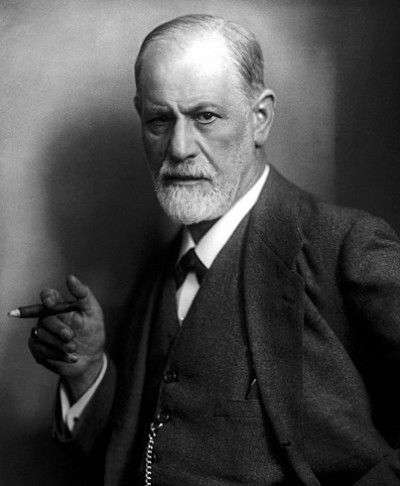

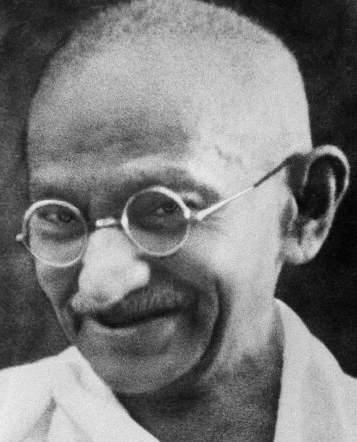
コメント